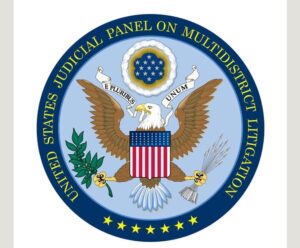
Duane Morris Takeaway: This week’s episode of the Class Action Weekly Wire features Duane Morris partners Jerry Maatman and Sean McConnell with their discussion of key rulings and developments in the antitrust class action space, including a landmark settlement resolving litigation spurred by college athletes’ claims regarding the NCAA’s ban on monetization of name, image, and likeness.
Check out today’s episode and subscribe to our show from your preferred podcast platform: Spotify, Amazon Music, Apple Podcasts, Google Podcasts, the Samsung Podcasts app, Podcast Index, Tune In, Listen Notes, iHeartRadio, Deezer, YouTube or our RSS feed.
Episode Transcript
Jerry Maatman: Welcome loyal blog listeners. Thank you for being here on our weekly podcast, the Class Action Weekly Wire. I’m excited to introduce Sean McConnell, my partner in our Philadelphia office, who chairs our antitrust defense group. Welcome, Sean!
Sean McConnell: Thank you, Jerry. I’m very happy to be part of the podcast today.
Jerry: Today we’re talking about key issues in antitrust class action litigation. We recently published, under your guidance, the Duane Morris Antitrust Class Action Review. Readers can get it for free off of our blog. Sean, in the antitrust class action world, what sorts of issues is the publication focusing on this year?
Sean: Well, we had one fairly large decision recently this year from the U.S. Supreme Court in Visa v. National ATM Council. In that case, the United States Supreme Court declined a petition for review submitted by both Visa and MasterCard that urged the Supreme Court to review a circuit split according to petitioners over the correct standard of review that courts should use when evaluating motions for class certification. Visa and MasterCard argued that the U.S. Court of Appeals for the DC. Circuit erred by only requiring plaintiffs to show that questions common to the class predominate and allowing the fact finder later in proceedings to address issues related to uninjured class members. So, by denying the petition for review, the U.S. Supreme Court has left that standard open for interpretation by the circuit courts.
Jerry: I think that’s a really significant decision, and certainly the D.C. Circuit’s opinion ought to be a required read for any counsel involved in antitrust class actions involving price fixing allegations. I think it underscores how important the standard for review is. To me, securing class certification is the Holy Grail on the plaintiff side of the V. They file the case, they certify it, they monetize it. If you take a deep dive into the D.C. Circuit’s ruling, what are some of the takeaways that you think are important?
Sean: Sure. So we’ll start with the kind of the basic facts, Jerry. The plaintiffs for the case where the petitioners involved ATM operators and the defendants, of course, were Visa and MasterCard. You know, global payment technology companies that operate networks that connect various financial institutions together, so that when a consumer is using an ATM they can access their bank, even if they’re using an ATM from another member bank that’s using that network. And the plaintiffs allege that the defendants used an ATM nondiscrimination rule, which kept fees the same across various networks, and prevented ATM operators from playing networks off of each other, and getting lower rates for their users and plaintiffs, allege that those rules allowed defendants to actually charge supracompetitive transaction fees, and to foreclose competition from those other competing ATM networks. The D.C. Circuit Court affirmed a district court ruling that granted class certification with respect to three different classes. So the first two classes, which were not at issue in the Supreme Court decision involved consumers, but the third class involved the ATM operators themselves. And according to defendants, the D.C. Circuit used a lower standard for class certification similar to one used by the Eighth and Ninth Circuits, whereas the Second, Third, Fifth, and Eleventh Circuits employ a more rigorous, careful consideration standard regarding plaintiffs’ burden to establish predominance. And by denying review, the issue remains unresolved in terms of Rule 23 class certification standards.
Jerry: You know, I think it’s much like buying real estate – location, location, location is everything. And in one circuit, a case might not get certified and the defendant would win yet in another circuit, depending on the difference in the standard plaintiffs might be successful. It sounds to me like this is going to end up in the U.S. Supreme Court someday. Were there other notable developments that you think are important to corporate counsel in the past 12 months on the antitrust space?
Sean: Yes, Jerry, there were a few very high profile settlements in the class action world this year focusing on antitrust class actions in both collegiate and professional sports. So, the first, which I’m sure many are familiar with, involves the college athlete, name, image, and likeness antitrust litigation. And shortly after the Ninth Circuit declined to decertify the certified class of former college athletes, who sought damages due to the NCAA’s ban on compensation, going back to 2016, the NCAA agreed to a settlement with the class in the amount of $2.77 billion. The class contains hundreds of thousands of former student athletes who claimed they were owed name, image, and likeness compensation during that period. The payments as part of the settlement will be spread out over 10 years, and the settlement will also establish a framework for revenue sharing between schools, conferences, and the athletes themselves. The settlement potentially ends one of the NCAA’s most significant legal battles, but still faces other antitrust class action lawsuits over player compensation and transfer rules and will likely face other issues related to how it will compensate athletes going forward. The NCAA, of course, has been lobbying Congress for many years for federal legislation on name, image, and likeness and for an antitrust exemption that would allow the schools, the conferences, and the NCAA itself to, you know, collectively bargain or arrange with student athletes compensation rules. But absent that ability to collectively bargain, or for the players to unionize, any such arrangement with the student athletes has been considered a violation of Section 1 of the Sherman Act. So it’s still yet to be decided what will happen going forward on how these schools, conferences, and the NCAA itself will be able to compensate student athletes going forward absent an antitrust exemption.
Jerry: It’s so interesting to me as a sports fan how there’s such a tie between an antitrust law and college athletics. Also, I’ve been involved on the professional side with the LIV and the PGA Tour. I know that you’re quite a thought leader in this space, and you’ve written quite a bit on MMA fighters. I know that that was an important development this year. Could you share a little bit of your thoughts on that case?
Sean: Sure, you know, one of the most significant kind of antitrust wage and compensation cases from the past year actually happened in the context of UFC fighters and mixed martial artists. The UFC’s parent company TKO Holding Inc. revealed recently that it will pay $335 million to settle a class action brought by MMA fighters who alleged that UFC engaged in anticompetitive conduct to suppress the fighters’ wages in the case Le v. Zuffa. The parties had engaged the mediation in February, and were set for trial for April. And you know, practitioners and thought leaders were excited for the case because it was really the first kind of monopsony antitrust class action. The prior rulings in the case are required reading for any corporate counsel handling antitrust class action litigation involving wage suppression issues. The plaintiffs allege that UFC engaged in a in a practice of using exclusive contracts as well as its overall market power with respect to mix mixed martial arts and a series of acquisitions consolidating the market and buying up competing promoters of MMA fights to suppress the wages of the fighters and their opportunities to and earn more endorsement, money, and other forms of compensation. And the class alleged damages of upwards of $1.6 billion. The parties will still, despite the settlement agreement in principle, will still need to present that settlement to the court for preliminary and final approval. Of course, pursuant to Rule 23, but the settlement itself really underscores the ability of workers to use the antitrust laws to tilt labor market dynamics in their favor and to increase workers bargaining leverage for get greater compensation and benefits going forward.
Jerry: Think it’s very interesting, too. It kind of foreshadows the Biden administration arm of the Department of Justice getting involved in both criminal civil wage suppression antitrust cases. So the remaining chapters of the book have a long way to go to be written. But thank you so much for Sean, for sharing your expertise and joining us. And thank you, loyal blog listeners, for tuning into this week’s Class Action Weekly Wire.
Sean: Thank you very much, Jerry.











